The Cambridge History of China. Vol. 12: Republican China, 1912-1949, Part 1
Подождите немного. Документ загружается.

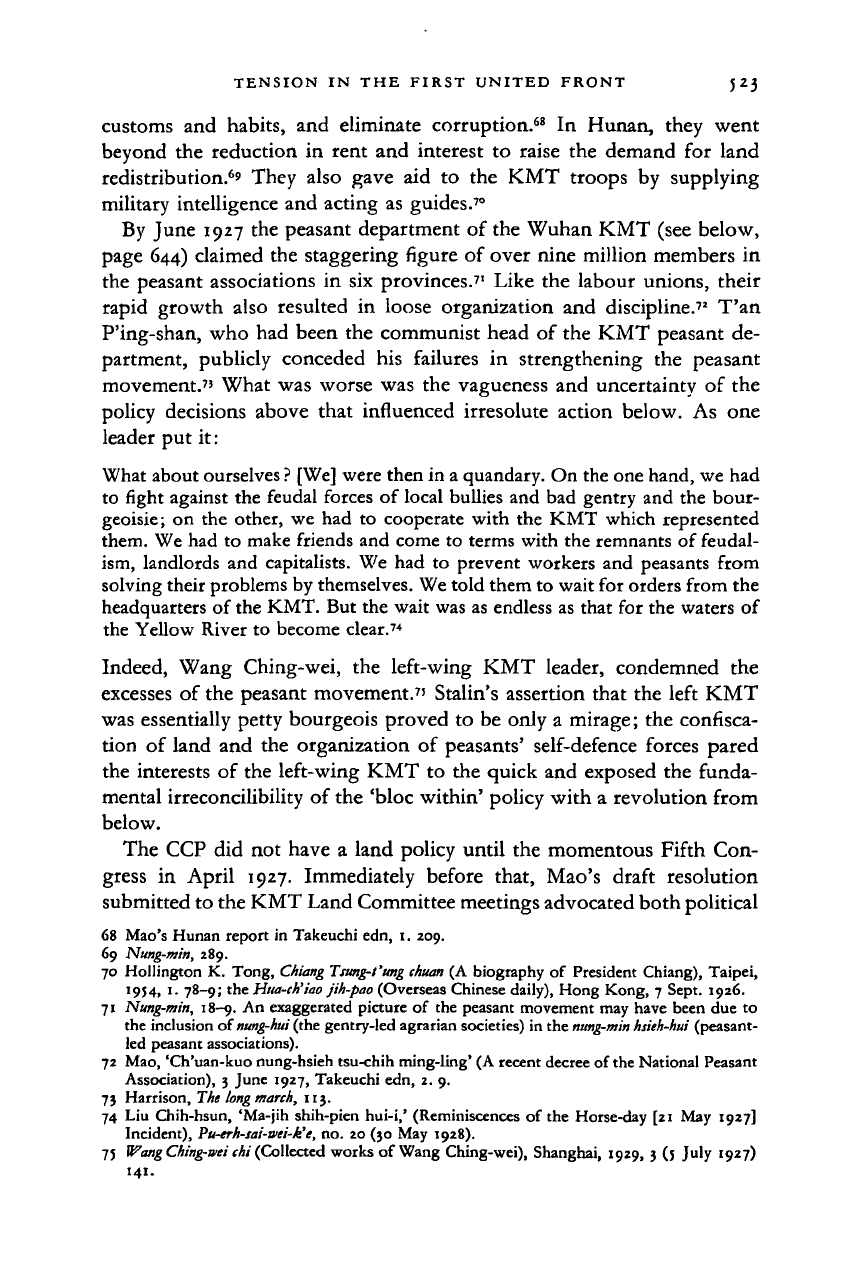
TENSION IN THE FIRST UNITED FRONT 523
customs and habits, and eliminate corruption.
68
In Hunan, they went
beyond the reduction in rent and interest to raise the demand for land
redistribution.
6
' They also gave aid to the KMT troops by supplying
military intelligence and acting as guides.
70
By June 1927 the peasant department of the Wuhan KMT (see below,
page 644) claimed the staggering figure of over nine million members in
the peasant associations in six provinces.
71
Like the labour unions, their
rapid growth also resulted in loose organi2ation and discipline.
72
T'an
P'ing-shan, who had been the communist head of the KMT peasant de-
partment, publicly conceded his failures in strengthening the peasant
movement.
7
' What was worse was the vagueness and uncertainty of the
policy decisions above that influenced irresolute action below. As one
leader put it:
What about ourselves
?
[We] were then in a quandary. On the one hand, we had
to fight against the feudal forces of local bullies and bad gentry and the bour-
geoisie; on the other, we had to cooperate with the KMT which represented
them. We had to make friends and come to terms with the remnants of feudal-
ism, landlords and capitalists. We had to prevent workers and peasants from
solving their problems by themselves.
We
told them to wait for orders from the
headquarters of the KMT. But the wait was as endless as that for the waters of
the Yellow River to become clear.
74
Indeed, Wang Ching-wei, the left-wing KMT leader, condemned the
excesses of the peasant movement.
7
' Stalin's assertion that the left KMT
was essentially petty bourgeois proved to be only a mirage; the confisca-
tion of land and the organization of peasants' self-defence forces pared
the interests of the left-wing KMT to the quick and exposed the funda-
mental irreconcilibility of the 'bloc within' policy with a revolution from
below.
The CCP did not have a land policy until the momentous Fifth Con-
gress in April 1927. Immediately before that, Mao's draft resolution
submitted to the KMT Land Committee meetings advocated both political
68 Mao's Hunan report in Takeuchi edn, i. 209.
69 Nung-min, 289.
70 Hollington K. Tong,
Chiang Tsung-t'ung chuan
(A biography of President Chiang), Taipei,
1954,
1. 78-9; the
Hua-ch'iao
jih-pao (Overseas Chinese daily), Hong Kong, 7 Sept. 1926.
71 Nung-min, 18-9. An exaggerated picture of the peasant movement may have been due to
the inclusion of
nung-hui
(the gentry-led agrarian societies) in the
nung-min hsieh-hui
(peasant-
led peasant associations).
72 Mao, 'Ch'uan-kuo nung-hsieh tsu-chih ming-ling' (A recent decree of the National Peasant
Association), 3 June 1927, Takeuchi edn, 2. 9.
73 Harrison,
The long
march,
113.
74 Liu Chih-hsun, 'Ma-jih shih-pien hui-i,' (Reminiscences of the Horse-day [21 May 1927]
Incident),
Pu-erh-sai-n/ei-k'e,
no. 20 (30 May 1928).
75
Wang Ching-wei
ihi (Collected works of Wang Ching-wei), Shanghai, 1929, 3 (5 July 1927)
141.
Cambridge Histories Online © Cambridge University Press, 2008
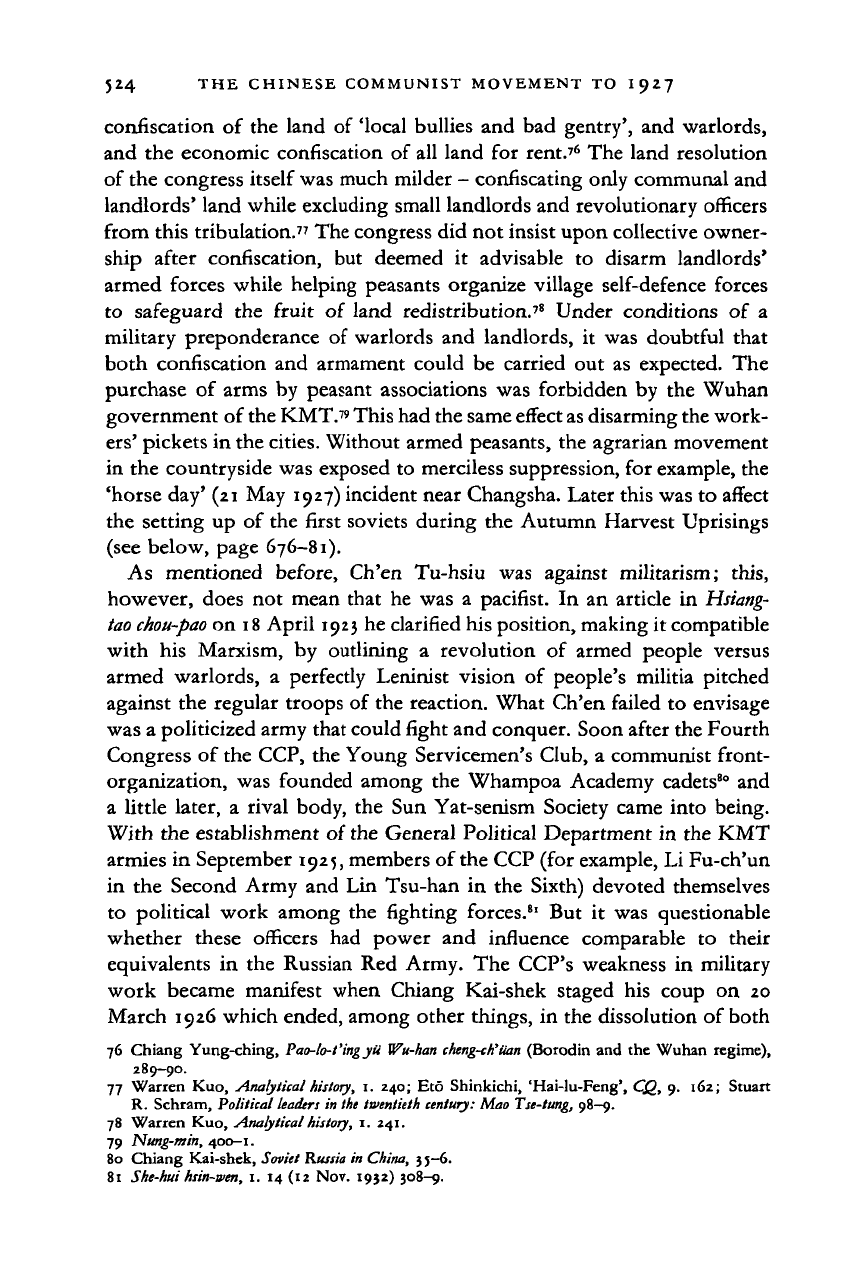
524 THE CHINESE COMMUNIST MOVEMENT TO 1927
confiscation of the land of 'local bullies and bad gentry', and warlords,
and the economic confiscation of all land for rent.'
6
The land resolution
of the congress itself was much milder - confiscating only communal and
landlords' land while excluding small landlords and revolutionary officers
from this tribulation." The congress did not insist upon collective owner-
ship after confiscation, but deemed it advisable to disarm landlords'
armed forces while helping peasants organize village self-defence forces
to safeguard the fruit of land redistribution.
78
Under conditions of a
military preponderance of warlords and landlords, it was doubtful that
both confiscation and armament could be carried out as expected. The
purchase of arms by peasant associations was forbidden by the Wuhan
government of the KMT.
79
This had the same effect
as
disarming the work-
ers'
pickets in the cities. Without armed peasants, the agrarian movement
in the countryside was exposed to merciless suppression, for example, the
'horse day' (21 May 1927) incident near Changsha. Later this was to affect
the setting up of the first Soviets during the Autumn Harvest Uprisings
(see below, page 676-81).
As mentioned before, Ch'en Tu-hsiu was against militarism; this,
however, does not mean that he was a pacifist. In an article in
Usiang-
tao chou-pao
on 18 April 1923 he clarified his position, making it compatible
with his Marxism, by outlining a revolution of armed people versus
armed warlords, a perfectly Leninist vision of people's militia pitched
against the regular troops of the reaction. What Ch'en failed to envisage
was a politicized army that could fight and conquer. Soon after the Fourth
Congress of the CCP, the Young Servicemen's Club, a communist front-
organization, was founded among the Whampoa Academy cadets
80
and
a little later, a rival body, the Sun Yat-senism Society came into being.
With the establishment of the General Political Department in the KMT
armies in September 1925, members of the CCP (for example, Li Fu-ch'un
in the Second Army and Lin Tsu-han in the Sixth) devoted themselves
to political work among the fighting forces.
8
' But it was questionable
whether these officers had power and influence comparable to their
equivalents in the Russian Red Army. The CCP's weakness in military
work became manifest when Chiang Kai-shek staged his coup on 20
March 1926 which ended, among other things, in the dissolution of both
76 Chiang Yung-ching, Pao-lo-t'ingyti
Wu-han cheng-ch'iian
(Borodin and the Wuhan regime),
289-90.
77 Warren Kuo, Analytical
history,
i. 240; Eto Shinkichi, 'Hai-lu-Feng', CQ, 9. 162; Stuart
R. Schram, Political
leaders
in
the twentieth
century:
Mao
Tse-tung,
98-9.
78 Warren Kuo, Analytical
history,
1. 241.
79 Nung-min,
400-1.
80 Chiang Kai-shek, Soviet
Russia
in
China,
35-6.
81
She-hui
hsin-aen,
1. 14 (12 Nov. 1932) 308-9.
Cambridge Histories Online © Cambridge University Press, 2008
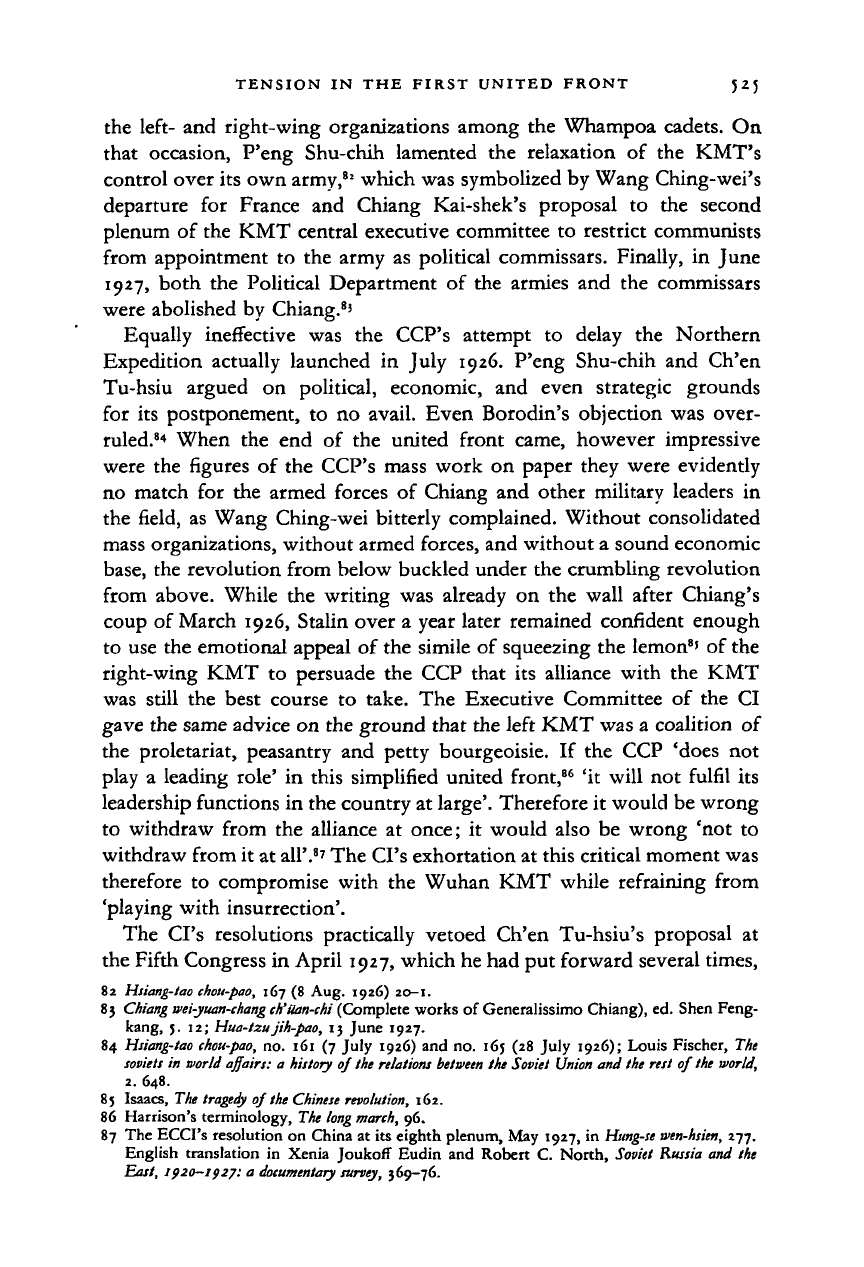
TENSION IN THE FIRST UNITED FRONT 525
the left- and right-wing organizations among the Whampoa cadets. On
that occasion, P'eng Shu-chih lamented the relaxation of the KMT's
control over its own army,
82
which was symbolized by Wang Ching-wei's
departure for France and Chiang Kai-shek's proposal to the second
plenum of the KMT central executive committee to restrict communists
from appointment to the army as political commissars. Finally, in June
1927,
both the Political Department of the armies and the commissars
were abolished by Chiang.
8
'
Equally ineffective was the CCP's attempt to delay the Northern
Expedition actually launched in July 1926. P'eng Shu-chih and Ch'en
Tu-hsiu argued on political, economic, and even strategic grounds
for its postponement, to no avail. Even Borodin's objection was over-
ruled.
84
When the end of the united front came, however impressive
were the figures of the CCP's mass work on paper they were evidently
no match for the armed forces of Chiang and other military leaders in
the field, as Wang Ching-wei bitterly complained. Without consolidated
mass organizations, without armed forces, and without a sound economic
base,
the revolution from below buckled under the crumbling revolution
from above. While the writing was already on the wall after Chiang's
coup of March 1926, Stalin over a year later remained confident enough
to use the emotional appeal of the simile of squeezing the lemon
8
' of the
right-wing KMT to persuade the CCP that its alliance with the KMT
was still the best course to take. The Executive Committee of the CI
gave the same advice on the ground that the left KMT was a coalition of
the proletariat, peasantry and petty bourgeoisie. If the CCP 'does not
play a leading role' in this simplified united front,
86
'it will not fulfil its
leadership functions in the country at large'. Therefore it would be wrong
to withdraw from the alliance at once; it would also be wrong 'not to
withdraw from it at all'.
87
The CI's exhortation at this critical moment was
therefore to compromise with the Wuhan KMT while refraining from
'playing with insurrection'.
The CI's resolutions practically vetoed Ch'en Tu-hsiu's proposal at
the Fifth Congress in April 1927, which he had put forward several times,
82 Hsiang-tao
ehou-pao,
167 (8 Aug. 1926) 20-1.
83 Chiang wei-yuan-chang ch'iian-chi
(Complete works of
Generalissimo
Chiang),
ed. Shen Feng-
kang,
5. 12; Hua-tzujih-pao, 13 June 1927.
84 Hsiang-tao
chou-pao,
no. 161 (7 July 1926) and no. 165 (28 July
1926);
Louis Fischer, The
Soviets in world affairs: a history of the relations between the Soviet Union and the rest of the world,
2.
648.
85
Isaacs,
The tragedy
of
the Chinese
revolution,
162.
86
Harrison's terminology, The
long
march,
96.
87
The ECCI's resolution on China at its eighth plenum, May 1927, in
Hung-se
wen-hsien,
277.
English
translation in Xenia Joukoff Eudin and Robert C.
North,
Soviet Russia and the
East, 1920—1927: a documentary survey, 369-76.
Cambridge Histories Online © Cambridge University Press, 2008
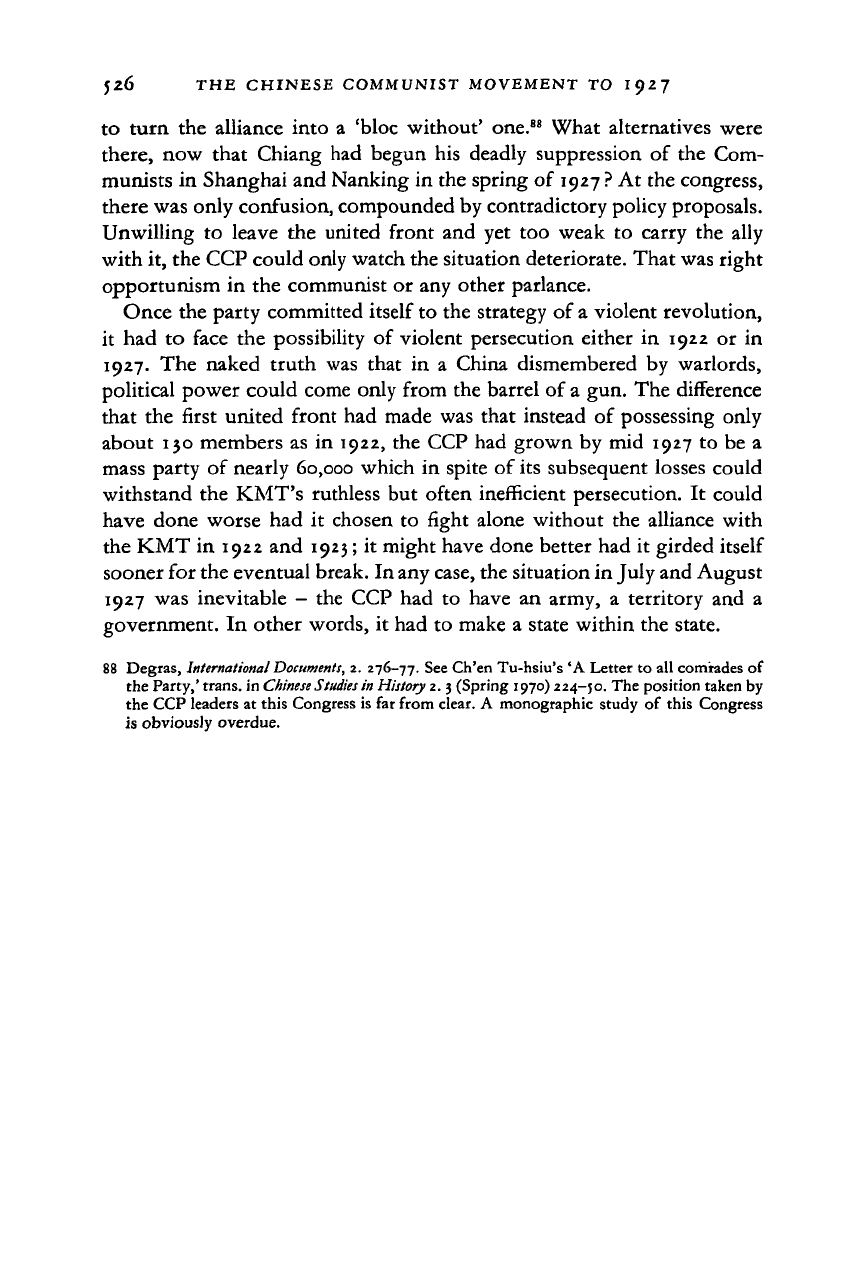
526 THE CHINESE COMMUNIST MOVEMENT TO 1927
to turn
the
alliance into
a
'bloc without' one.
88
What alternatives were
there,
now
that Chiang
had
begun
his
deadly suppression
of the Com-
munists
in
Shanghai and Nanking
in
the spring
of
1927
?
At
the congress,
there was only confusion, compounded by contradictory policy proposals.
Unwilling
to
leave
the
united front
and yet too
weak
to
carry
the
ally
with it, the CCP could only watch the situation deteriorate. That was right
opportunism
in the
communist
or any
other parlance.
Once
the
party committed itself
to the
strategy
of
a violent revolution,
it
had to
face
the
possibility
of
violent persecution either
in 1922 or in
1927.
The
naked truth
was
that
in a
China dismembered
by
warlords,
political power could come only from
the
barrel
of
a gun.
The
difference
that
the
first united front
had
made
was
that instead
of
possessing only
about 130 members
as in
1922,
the
CCP
had
grown
by mid
1927
to be a
mass party
of
nearly 60,000 which
in
spite
of
its subsequent losses could
withstand
the
KMT's ruthless
but
often inefficient persecution.
It
could
have done worse
had it
chosen
to
fight alone without
the
alliance with
the KMT
in
1922
and
1923;
it
might have done better
had it
girded itself
sooner
for
the eventual break. In any case, the situation in July and August
1927
was
inevitable
—
the CCP had to
have
an
army,
a
territory
and a
government.
In
other words,
it had to
make
a
state within
the
state.
88 Degras,
International
Documents,
2. 276-77. See Ch'en Tu-hsiu's
'A
Letter
to
all comrades of
the Party,'trans, in
Chinese
Studies
in History
2.
3
(Spring 1970)224-50. The position taken by
the CCP leaders
at
this Congress is
far
from clear.
A
monographic study
of
this Congress
is obviously overdue.
Cambridge Histories Online © Cambridge University Press, 2008
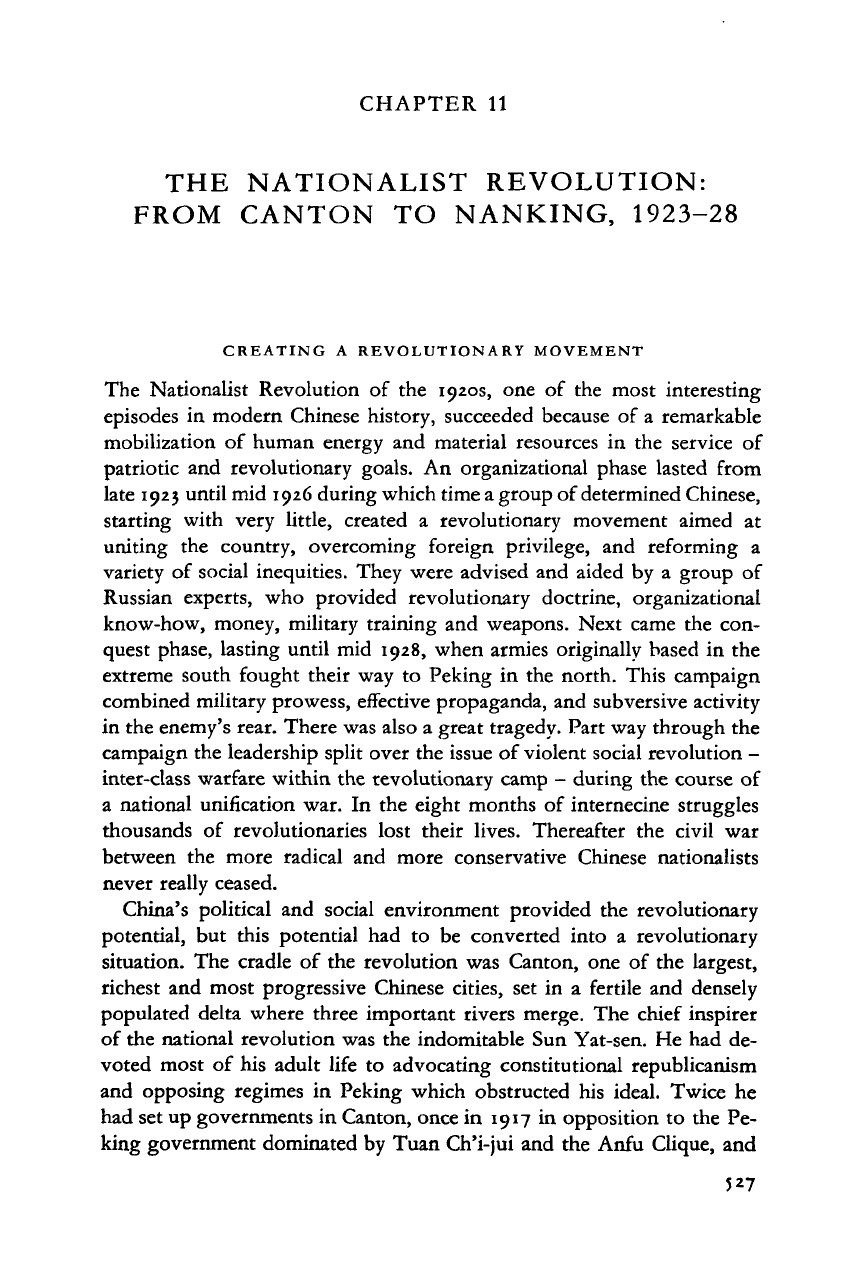
CHAPTER 11
THE NATIONALIST REVOLUTION:
FROM CANTON TO NANKING, 1923-28
CREATING A REVOLUTIONARY MOVEMENT
The Nationalist Revolution of the 1920s, one of the most interesting
episodes in modern Chinese history, succeeded because of a remarkable
mobilization of human energy and material resources in the service of
patriotic and revolutionary goals. An organizational phase lasted from
late 1923 until mid 1926 during which time a group of determined Chinese,
starting with very little, created a revolutionary movement aimed at
uniting the country, overcoming foreign privilege, and reforming a
variety of social inequities. They were advised and aided by a group of
Russian experts, who provided revolutionary doctrine, organizational
know-how, money, military training and weapons. Next came the con-
quest phase, lasting until mid 1928, when armies originally based in the
extreme south fought their way to Peking in the north. This campaign
combined military prowess, effective propaganda, and subversive activity
in the enemy's rear. There was also a great tragedy. Part way through the
campaign the leadership split over the issue of violent social revolution -
inter-class warfare within the revolutionary camp - during the course of
a national unification war. In the eight months of internecine struggles
thousands of revolutionaries lost their lives. Thereafter the civil war
between the more radical and more conservative Chinese nationalists
never really ceased.
China's political and social environment provided the revolutionary
potential, but this potential had to be converted into a revolutionary
situation. The cradle of the revolution was Canton, one of the largest,
richest and most progressive Chinese cities, set in a fertile and densely
populated delta where three important rivers merge. The chief inspirer
of the national revolution was the indomitable Sun Yat-sen. He had de-
voted most of his adult life to advocating constitutional republicanism
and opposing regimes in Peking which obstructed his ideal. Twice he
had set up governments in Canton, once in 1917 in opposition to the Pe-
king government dominated by Tuan Ch'i-jui and the Anfu Clique, and
5 27
Cambridge Histories Online © Cambridge University Press, 2008

528 THE NATIONALIST REVOLUTION, I 9
2
3-8
again late
in
1920
in
opposition
to
the government dominated
by the
Chihli Clique. During the second regime he arranged for
a
rump parlia-
ment
to
elect him 'Extraordinary President'
of
what
he
proclaimed
to
be the Chinese Republic.
In
the spring
of
1922,
in
alliance with several
military factions,
he
attempted
a
campaign against the Peking govern-
ment, but Wu P'ei-fu defeated his major ally, Chang Tso-lin, while troops
of his own theoretical subordinate, Ch'en Chiung-ming, drove
Dr
Sun
from his presidential residence
in
Canton
on
the night
of
15/16 June.
By mid August 1922
he
was back
in
Shanghai scheming
to
acquire
the
presidency
in
Peking
by
political means and
to
recover his base
in the
south by military force.
Sun Yat-sen's weak position in 192}
Dr Sun was unsuccessful in the first aim, but by 15 January 1923 troops
in his pay had driven Ch'en Chiung-ming from Canton, and he returned
there in triumph on
21
February. He was then
5 6
years old, but in less than
two years
he
would
be
struck down
by
cancer.
In
this brief period
he
launched the organizational phase
of
the Nationalist Revolution
in the
face of great initial difficulties.
The difficulties may
be
summarized
as
follows. Upon
his
return
to
Canton, Sun's hold on the southern base was precarious, for he lacked the
substance
of
power. He was
not
really master
of
the armies which had
captured
the
base
for
him
nor did he
control
the
purse strings
of
its
government. His Nationalist Party,
the
Chung-kuo Kuo-min-tang, had
only
a
few thousand members
in
China, was loosely organized, and had
no well-devised strategy for achieving its reformist goals, which aroused
little enthusiasm from the articulate public. The goals were stated
in a
Kuomintang manifesto
on 1
January 1923, which gave some detail
to
Sun's famous Three People's Principles
-
nationalism, democracy
and
people's livelihood.
1
His problem was
to
create
a
dynamic revolutionary
movement,
to
gain control over sources
of
substantial revenue, and
to
create
a
subservient and reliable military force that could protect and
enlarge the southern base.
The military problem had two aspects, internal and external.
A
mis-
cellany
of
essentially autonomous divisions, brigades and regiments had
taken Canton when their commanders were bought over
by Dr
Sun's
associates
in
Hong Kong. Those from Yunnan were headed by General
Yang Hsi-min
but
there were several independent Yunnanese forces,
1 See Milton
J. T.
Shieh,
The
Kuomintang:
selected historical
documents,
1894-1966, 65-70.
Cambridge Histories Online © Cambridge University Press, 2008
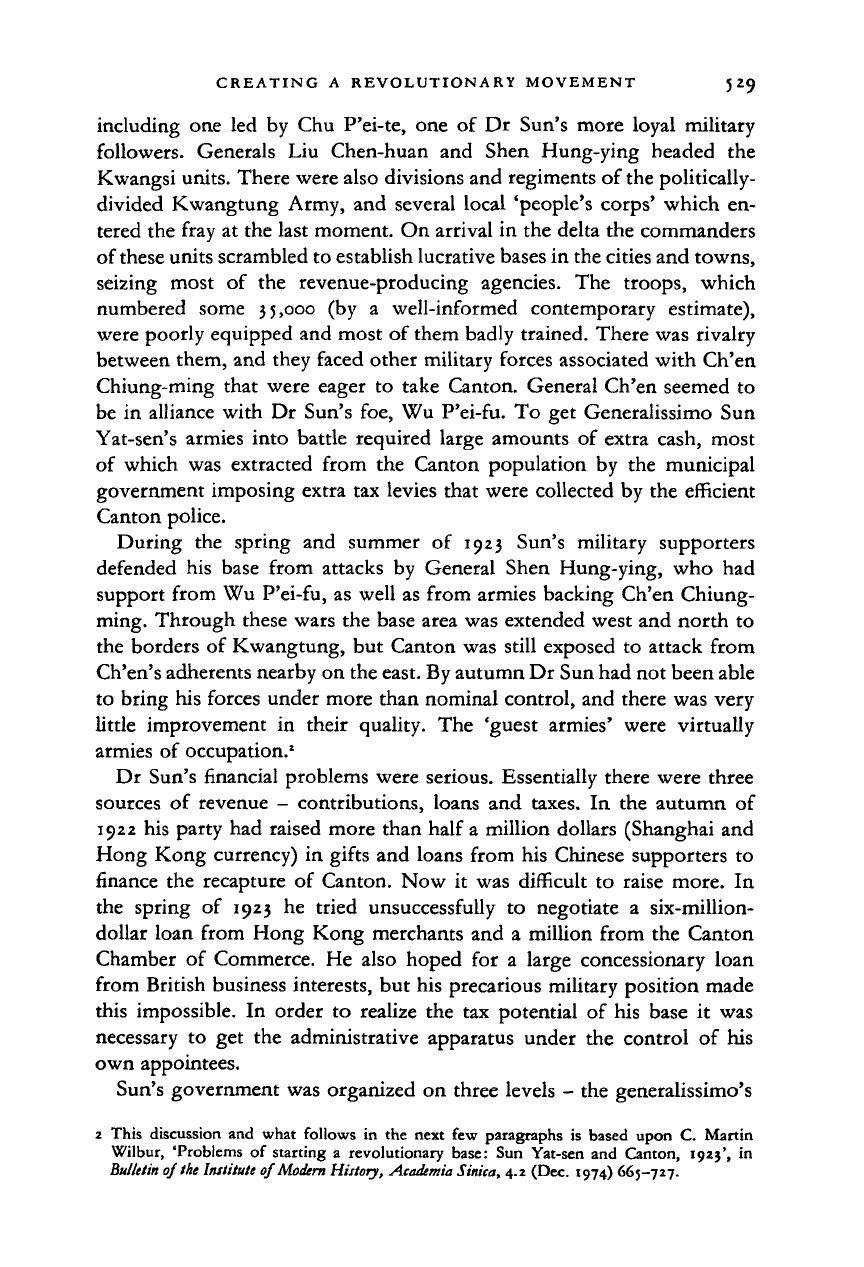
CREATING A REVOLUTIONARY MOVEMENT 529
including one led by Chu P'ei-te, one of Dr Sun's more loyal military
followers. Generals Liu Chen-huan and Shen Hung-ying headed the
Kwangsi units. There were also divisions and regiments of the politically-
divided Kwangtung Army, and several local 'people's corps' which en-
tered the fray at the last moment. On arrival in the delta the commanders
of these units scrambled to establish lucrative bases in the cities and towns,
seizing most of the revenue-producing agencies. The troops, which
numbered some 35,000 (by a well-informed contemporary estimate),
were poorly equipped and most of them badly trained. There was rivalry
between them, and they faced other military forces associated with Ch'en
Chiung-ming that were eager to take Canton. General Ch'en seemed to
be in alliance with Dr Sun's foe, Wu P'ei-fu. To get Generalissimo Sun
Yat-sen's armies into battle required large amounts of extra cash, most
of which was extracted from the Canton population by the municipal
government imposing extra tax levies that were collected by the efficient
Canton police.
During the spring and summer of 1923 Sun's military supporters
defended his base from attacks by General Shen Hung-ying, who had
support from Wu P'ei-fu, as well as from armies backing Ch'en Chiung-
ming. Through these wars the base area was extended west and north to
the borders of Kwangtung, but Canton was still exposed to attack from
Ch'en's adherents nearby on the east. By autumn Dr Sun had not been able
to bring his forces under more than nominal control, and there was very
little improvement in their quality. The 'guest armies' were virtually
armies of occupation.
2
Dr Sun's financial problems were serious. Essentially there were three
sources of revenue - contributions, loans and taxes. In the autumn of
1922 his party had raised more than half a million dollars (Shanghai and
Hong Kong currency) in gifts and loans from his Chinese supporters to
finance the recapture of Canton. Now it was difficult to raise more. In
the spring of 1923 he tried unsuccessfully to negotiate a six-million-
dollar loan from Hong Kong merchants and a million from the Canton
Chamber of Commerce. He also hoped for a large concessionary loan
from British business interests, but his precarious military position made
this impossible. In order to realize the tax potential of his base it was
necessary to get the administrative apparatus under the control of his
own appointees.
Sun's government was organized on three levels - the generalissimo's
2 This discussion and what follows in the next few paragraphs is based upon C. Martin
Wilbur, 'Problems of starting a revolutionary base: Sun Yat-sen and Canton, 1923', in
Bulletin
of
the Institute
of
Modern
History, Acadtmia
Sinica,
4.2 (Dec. 1974) 665-727.
Cambridge Histories Online © Cambridge University Press, 2008
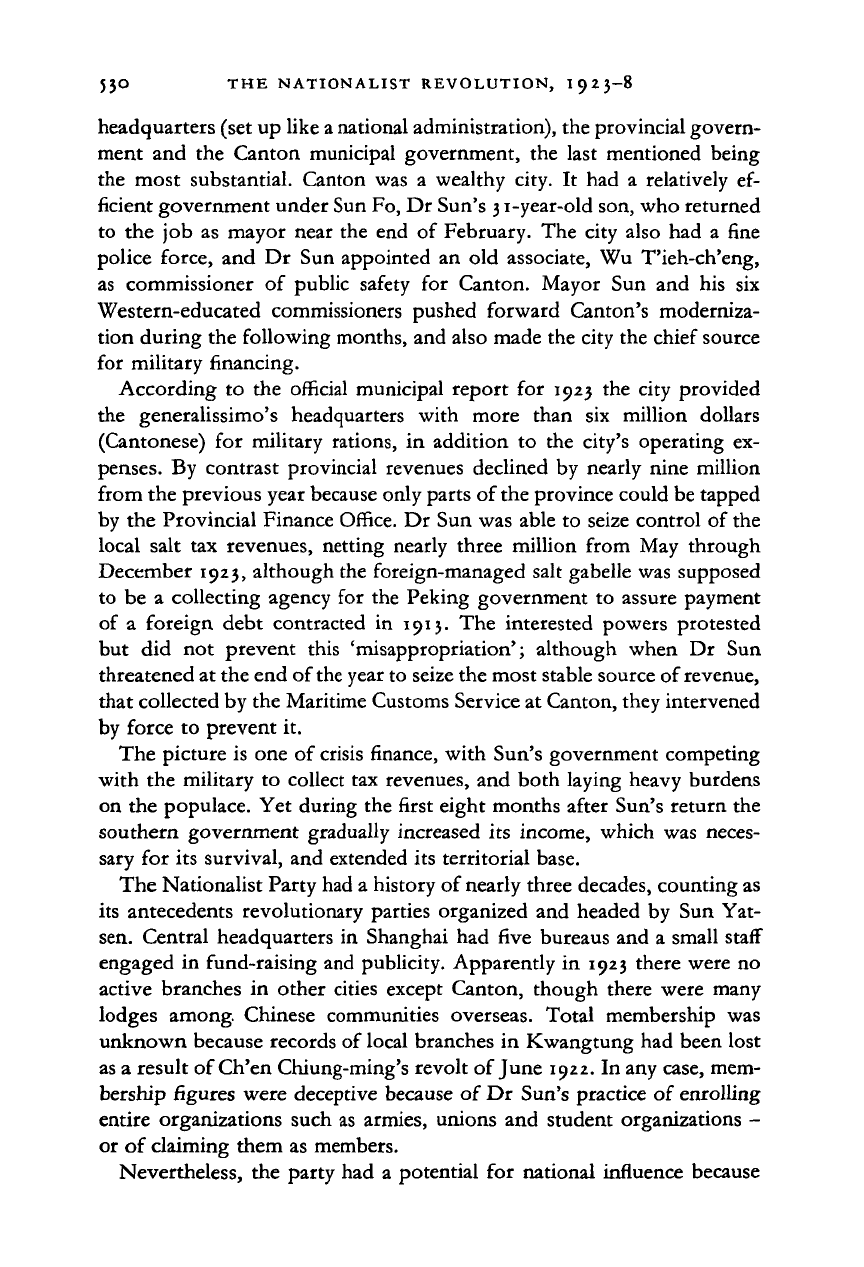
530 THE NATIONALIST REVOLUTION, 1923-8
headquarters (set up like a national administration), the provincial govern-
ment and the Canton municipal government, the last mentioned being
the most substantial. Canton was a wealthy city. It had a relatively ef-
ficient government under Sun Fo, Dr Sun's 31-year-old son, who returned
to the job as mayor near the end of February. The city also had a fine
police force, and Dr Sun appointed an old associate, Wu T'ieh-ch'eng,
as commissioner of public safety for Canton. Mayor Sun and his six
Western-educated commissioners pushed forward Canton's moderniza-
tion during the following months, and also made the city the chief source
for military financing.
According to the official municipal report for 1923 the city provided
the generalissimo's headquarters with more than six million dollars
(Cantonese) for military rations, in addition to the city's operating ex-
penses. By contrast provincial revenues declined by nearly nine million
from the previous year because only parts of the province could be tapped
by the Provincial Finance Office. Dr Sun was able to seize control of the
local salt tax revenues, netting nearly three million from May through
December 1923, although the foreign-managed salt gabelle was supposed
to be a collecting agency for the Peking government to assure payment
of a foreign debt contracted in 1913. The interested powers protested
but did not prevent this 'misappropriation'; although when Dr Sun
threatened at the end of
the
year to seize the most stable source of revenue,
that collected by the Maritime Customs Service at Canton, they intervened
by force to prevent it.
The picture is one of crisis finance, with Sun's government competing
with the military to collect tax revenues, and both laying heavy burdens
on the populace. Yet during the first eight months after Sun's return the
southern government gradually increased its income, which was neces-
sary for its survival, and extended its territorial base.
The Nationalist Party had a history of nearly three decades, counting as
its antecedents revolutionary parties organized and headed by Sun Yat-
sen. Central headquarters in Shanghai had five bureaus and a small staff
engaged in fund-raising and publicity. Apparently in 1923 there were no
active branches in other cities except Canton, though there were many
lodges among. Chinese communities overseas. Total membership was
unknown because records of local branches in Kwangtung had been lost
as a result of Ch'en Chiung-ming's revolt of June 1922. In any case, mem-
bership figures were deceptive because of Dr Sun's practice of enrolling
entire organizations such as armies, unions and student organizations -
or of claiming them as members.
Nevertheless, the party had a potential for national influence because
Cambridge Histories Online © Cambridge University Press, 2008
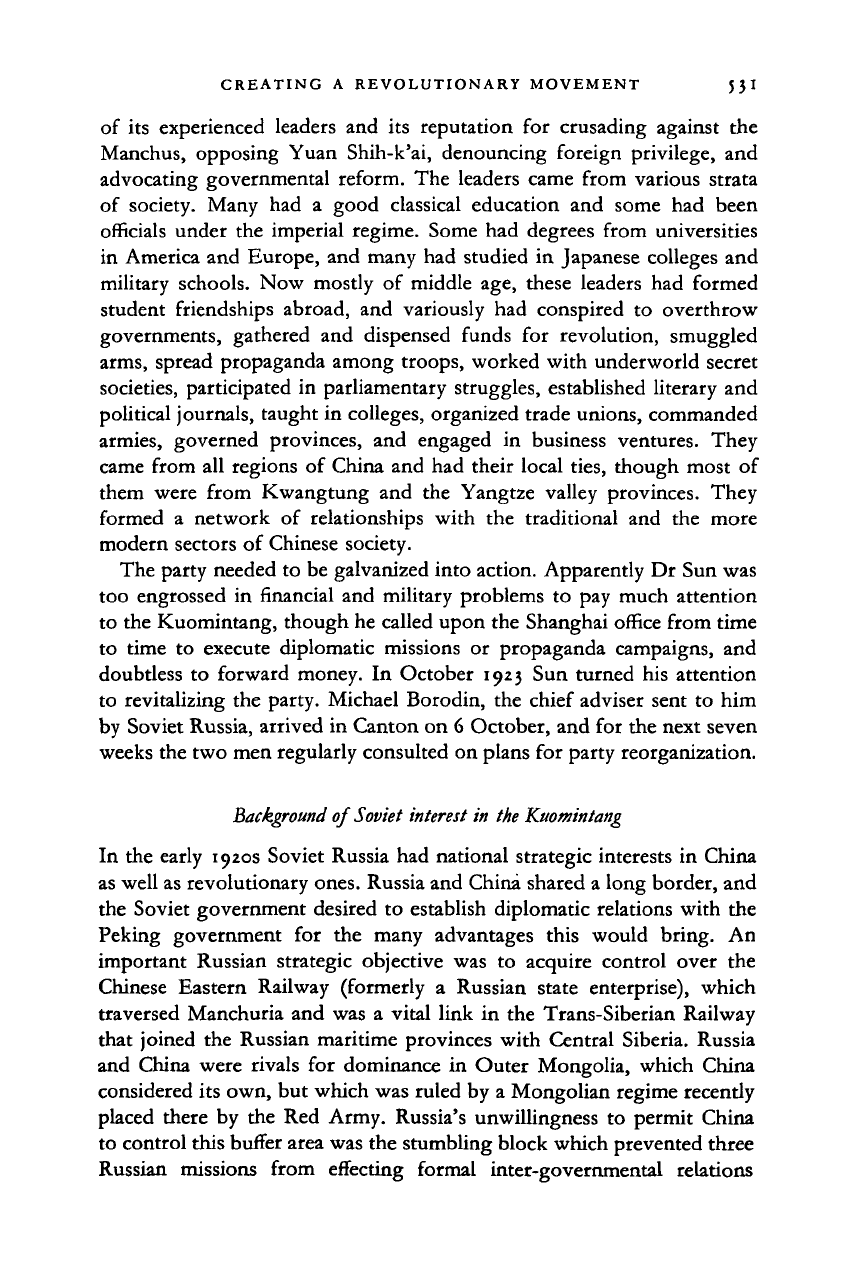
CREATING A REVOLUTIONARY MOVEMENT
5 3
I
of its experienced leaders and its reputation for crusading against the
Manchus, opposing Yuan Shih-k'ai, denouncing foreign privilege, and
advocating governmental reform. The leaders came from various strata
of society. Many had a good classical education and some had been
officials under the imperial regime. Some had degrees from universities
in America and Europe, and many had studied in Japanese colleges and
military schools. Now mostly of middle age, these leaders had formed
student friendships abroad, and variously had conspired to overthrow
governments, gathered and dispensed funds for revolution, smuggled
arms,
spread propaganda among troops, worked with underworld secret
societies, participated in parliamentary struggles, established literary and
political journals, taught in colleges, organized trade unions, commanded
armies, governed provinces, and engaged in business ventures. They
came from all regions of China and had their local ties, though most of
them were from Kwangtung and the Yangtze valley provinces. They
formed a network of relationships with the traditional and the more
modern sectors of Chinese society.
The party needed to be galvanized into action. Apparently Dr Sun was
too engrossed in financial and military problems to pay much attention
to the Kuomintang, though he called upon the Shanghai office from time
to time to execute diplomatic missions or propaganda campaigns, and
doubtless to forward money. In October 1923 Sun turned his attention
to revitalizing the party. Michael Borodin, the chief adviser sent to him
by Soviet Russia, arrived in Canton on 6 October, and for the next seven
weeks the two men regularly consulted on plans for party reorganization.
Background
of Soviet interest in the Kuomintang
In the early 1920s Soviet Russia had national strategic interests in China
as well as revolutionary ones. Russia and China shared a long border, and
the Soviet government desired to establish diplomatic relations with the
Peking government for the many advantages this would bring. An
important Russian strategic objective was to acquire control over the
Chinese Eastern Railway (formerly a Russian state enterprise), which
traversed Manchuria and was a vital link in the Trans-Siberian Railway
that joined the Russian maritime provinces with Central Siberia. Russia
and China were rivals for dominance in Outer Mongolia, which China
considered its own, but which was ruled by a Mongolian regime recently
placed there by the Red Army. Russia's unwillingness to permit China
to control this buffer area was the stumbling block which prevented three
Russian missions from effecting formal inter-governmental relations
Cambridge Histories Online © Cambridge University Press, 2008
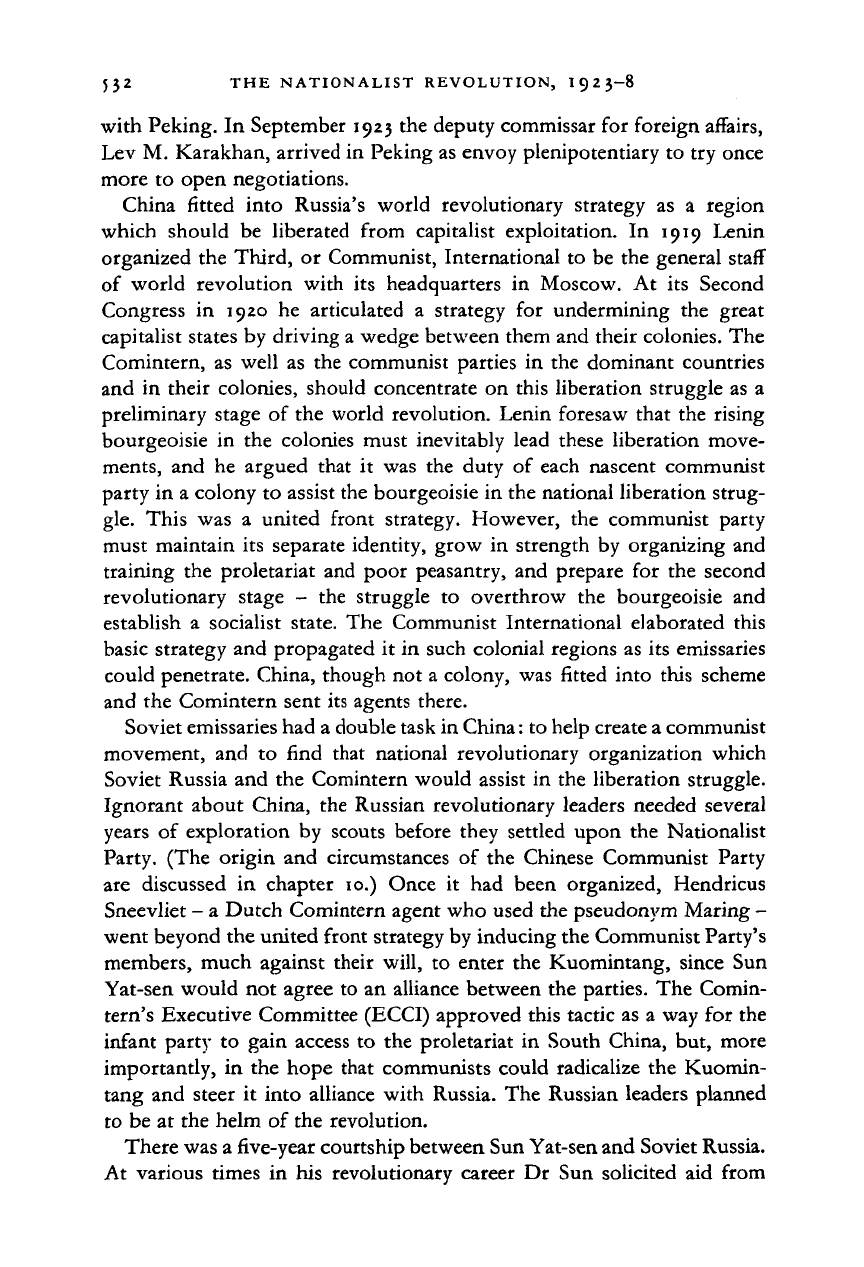
532 THE NATIONALIST REVOLUTION, I 9 2 3-8
with Peking. In September 1923 the deputy commissar for foreign affairs,
Lev M. Karakhan, arrived in Peking as envoy plenipotentiary to try once
more to open negotiations.
China fitted into Russia's world revolutionary strategy as a region
which should be liberated from capitalist exploitation. In 1919 Lenin
organized the Third, or Communist, International to be the general staff
of world revolution with its headquarters in Moscow. At its Second
Congress in 1920 he articulated a strategy for undermining the great
capitalist states by driving a wedge between them and their colonies. The
Comintern, as well as the communist parties in the dominant countries
and in their colonies, should concentrate on this liberation struggle as a
preliminary stage of the world revolution. Lenin foresaw that the rising
bourgeoisie in the colonies must inevitably lead these liberation move-
ments, and he argued that it was the duty of each nascent communist
party in a colony to assist the bourgeoisie in the national liberation strug-
gle.
This was a united front strategy. However, the communist party
must maintain its separate identity, grow in strength by organizing and
training the proletariat and poor peasantry, and prepare for the second
revolutionary stage - the struggle to overthrow the bourgeoisie and
establish a socialist state. The Communist International elaborated this
basic strategy and propagated it in such colonial regions as its emissaries
could penetrate. China, though not a colony, was fitted into this scheme
and the Comintern sent its agents there.
Soviet emissaries had a double task in China: to help create a communist
movement, and to find that national revolutionary organization which
Soviet Russia and the Comintern would assist in the liberation struggle.
Ignorant about China, the Russian revolutionary leaders needed several
years of exploration by scouts before they settled upon the Nationalist
Party. (The origin and circumstances of the Chinese Communist Party
are discussed in chapter 10.) Once it had been organized, Hendricus
Sneevliet - a Dutch Comintern agent who used the pseudonym Maring -
went beyond the united front strategy by inducing the Communist Party's
members, much against their will, to enter the Kuomintang, since Sun
Yat-sen would not agree to an alliance between the parties. The Comin-
tern's Executive Committee (ECCI) approved this tactic as a way for the
infant party to gain access to the proletariat in South China, but, more
importantly, in the hope that communists could radicalize the Kuomin-
tang and steer it into alliance with Russia. The Russian leaders planned
to be at the helm of the revolution.
There was a five-year courtship between Sun Yat-sen and Soviet Russia.
At various times in his revolutionary career Dr Sun solicited aid from
Cambridge Histories Online © Cambridge University Press, 2008
